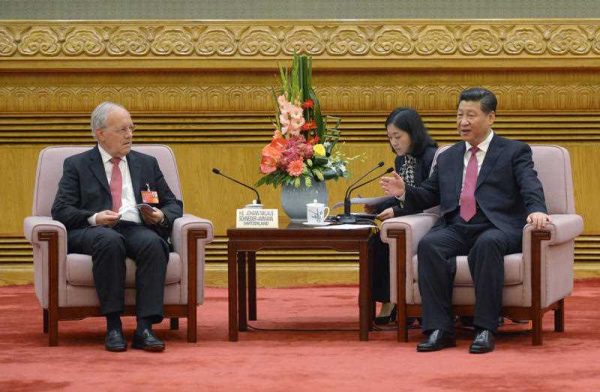China has also proposed the ‘Silk Road Economic Belt’ and the ‘21st Century Maritime Silk Road’, or ‘One Belt, One Road’ (OBOR), an even broader and more ambitious initiative that focuses on cooperation and economic integration of countries primarily in Eurasia and Africa. The AIIB will serve as the financing arm of OBOR. It will begin with authorised capital of US$50 billion, which will eventually be raised to US$100 billion. The projected investment for OBOR will be US$1.4 trillion, about 12 times larger than the Marshall Plan, the US aid program in post-war Western Europe, which stood at about US$120 billion in today’s value. In addition to economic benefits, the AIIB and OBOR will significantly facilitate movement of goods, services and people across national borders.
The AIIB and OBOR are important steps to realising President Xi Jinping’s ‘Chinese dream’. Over the past two decades, China has contributed substantially to the infrastructure or ‘hardware’ of many developing nations but it remains short in establishing ‘software’ or soft power. Beijing hopes that its new initiatives, with a non-coercive, non-military approach, will help enhance its international image as a responsible global power. China is also transitioning from export-oriented growth to a new model based on consumption and outward investment. This process was accelerated after the 2008–09 global financial crisis, which sharply weakened Western countries’ ability to absorb Chinese manufacturing products and to invest in developing countries.
China is not just investing in developing countries; it’s investing in developed economies as well. According to a recent study, Chinese firms spent nearly US$46 billion from 2000 to 2014 on new establishments and acquisitions in the United States, most of it in the past five years. If the United States continues to be a major recipient of China’s booming outward investment, it could receive between US$100–200 billion of investment by 2020. This would increase the number of full-time US jobs provided by China–US affiliates to somewhere between 200,000 and 400,000.
But China’s outward investment is a situation of damned if you do, damned if you don’t. For years the United States and its European allies have called China a ‘free rider’ and urged the country to shoulder more international responsibilities. Yet when China attempts to do so, the United States becomes suspicious of China’s intentions and concerned about China’s growing influence. Statements like President Obama’s claim that ‘we cannot allow China to set trade rules’ are inconsistent and arrogant from the Chinese perspective. Despite heavy pressure, most US allies have decided to join the AIIB. A new era is dawning upon us with China playing a more active role in a highly interdependent world where China aspires to be a major economic, political and diplomatic power. Both the United States and China need to adjust to the new global reality.
Chinese foreign policy is in transition and Xi has emerged as a strong and assertive leader. Its great ambitions notwithstanding, the Chinese leadership appears distracted by challenging domestic problems such as rampant corruption, a widening income gap, an aging population and the deteriorating environment. But it would be a mistake to perceive China’s new foreign policy initiatives as a sign that the government is abandoning Deng Xiaoping’s ‘lying low’ foreign policy strategy in pursuit of a more aggressive agenda that underestimates the domestic imperatives of such proposals.
There is significant domestic impetus for the AIIB and OBOR. Many of the infrastructure projects proposed under OBOR would benefit China’s poor inland regions by integrating these regions with global economies and helping to mitigate China’s rapidly growing wealth gap. They will also contribute to more balanced and sustainable development and allow China to relocate its labour-intensive and low value-added manufacturing facilities overseas, helping solve the severe environmental problem in China today.
But China still faces many challenges ahead in implementing the AIIB and OBOR. First, the United States and Japan remain non-committal to the AIIB despite their changed attitudes from firm opposition to cautious welcome. While the AIIB will probably still function well without the two, their participation would help improve the bank’s credit rating and add to its legitimacy.
Security will be another major challenge. As part of OBOR, China will build 81,000 kilometres (about 50,000 miles) of high-speed railway, more than that currently existing in the whole world, involving 65 countries on the way. Who is going to protect so many projects covering so many countries?
Many recipient countries in Asia have poor credit, which means many projects may sound promising at the beginning but will be hard to pursue. Agreement and consensus are typically reached at the top governmental level but implementation occurs at the local level. Local governments may not care about the central government’s policies and do not always cooperate with foreign investors. What is more, with a slower-growing economy and a falling foreign exchange reserve, how China will fund the AIIB and OBOR may become a real challenge. Recent market fluctuations in China may also undermine political support for such big projects overseas.
Many have suggested that the AIIB and OBOR and the US-led Trans-Pacific Partnership (TPP) can be complementary. The key is how to turn good intentions into actions of cooperation. Some bumpy roads lie ahead for China’s ambitious new initiatives.
Zhiqun Zhu is a professor of political science and international relations at Bucknell University.


The author is right that China “remains short in establishing ‘software’ or soft power” and is getting shorter by the day with or without AIIB, OBOR and any other fancy-worded names that Xi comes up with. What China misjudges is its see-through arrogance and culture of habitual distortions, become the bedrocks of far and near policy-makers. They’ll fake smiles and grasp firm of Chinese monies but, will divert most of those fast-dwindling resources (remember Chinese decades-long recession is here)to defensive fortresses against China.